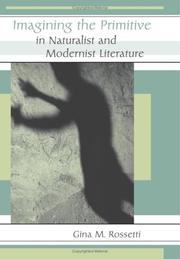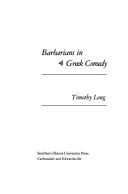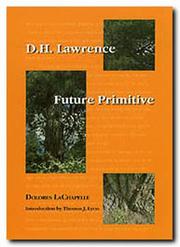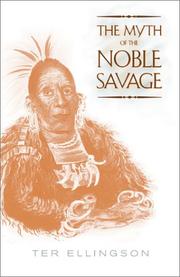| Listing 1 - 10 of 11 | << page >> |
Sort by
|
Book
ISBN: 2406151204 Year: 2023 Publisher: Classiques Garnier
Abstract | Keywords | Export | Availability | Bookmark
 Loading...
Loading...Choose an application
- Reference Manager
- EndNote
- RefWorks (Direct export to RefWorks)
Literature, Experimental --- Primitivism in literature --- History and criticism

ISBN: 0826265030 9780826265036 0826216250 9780826216250 Year: 2006 Publisher: Columbia University of Missouri Press
Abstract | Keywords | Export | Availability | Bookmark
 Loading...
Loading...Choose an application
- Reference Manager
- EndNote
- RefWorks (Direct export to RefWorks)
"Examines the depiction of primitive characters in naturalist and modernist texts, focusing on works by Jack London, Frank Norris, Eugene O'Neill, Theodore Dreiser, Willa Cather, Ernest Hemingway, Gertrude Stein, and Nella Larsen"--Provided by publisher.
American literature --- Primitivism in literature. --- Modernism (Literature) --- Naturalism in literature. --- History and criticism.
Book
ISSN: 00834564 ISBN: 311028667X 9783110286670 9783110286663 3110286661 Year: 2012 Volume: Bd. 143 Publisher: Berlin De Gruyter
Abstract | Keywords | Export | Availability | Bookmark
 Loading...
Loading...Choose an application
- Reference Manager
- EndNote
- RefWorks (Direct export to RefWorks)
Der Band zeigt die Chancen und Grenzen des Begriffs eines literarischen Primitivismus auf. Die Beiträge entwerfen Theorien des Primitivismus und rekonstruieren seine wissenschaftsgeschichtlichen Hintergründe, sie erarbeiten anhand von Beispielen aus der Literatur die Konturen eines literarischen Primitivismus und beleuchten dessen Verhältnis zum Primitivismus in der bildenden Kunst. Dabei erweist sich der Primitivismus als prägendes Moment in der Ausbildung der literarischen Moderne. This volume explores the usefulness and limitations of the concept of literary primitivism. The individual essays propose theories of primitivism and reconstruct its historical and theoretical background. Using literary examples, they reveal the contours of literary primitivism and explain its relationship to primitivism in the visual arts. The overall picture that emerges from the analysis is of primitivism as a powerful force in the development of literary modernity.
Primitivism in literature. --- Literature, Modern --- Modern literature --- Arts, Modern --- Themes, motives. --- History and criticism. --- Primitivism in literature --- Themes, motives --- History and criticism --- Literature, Modern - Themes, motives --- Literature, Modern - History and criticism --- Modernity. --- Primitivism.
Book
ISBN: 1503604098 9781503604094 9781503602366 1503602362 Year: 2018 Publisher: Stanford, California
Abstract | Keywords | Export | Availability | Bookmark
 Loading...
Loading...Choose an application
- Reference Manager
- EndNote
- RefWorks (Direct export to RefWorks)
This book fundamentally rethinks a pervasive and controversial concept in literary criticism and the history of ideas. Primitivism has long been accepted as a transhistorical tendency of the "civilized" to idealize that primitive condition against which they define themselves. In the modern era, this has been a matter of the "West" projecting its primitivist fantasies onto non-Western "others." Arguing instead that primitivism was an aesthetic mode produced in reaction to the apotheosis of European imperialism, and that the most intensively primitivist literary works were produced by imperialism's colonized subjects, the book overturns basic assumptions of the last two generations of literary scholarship. Against the grain, Ben Etherington contends that primitivism was an important, if vexed, utopian project rather than a form of racist discourse, a mode that emerged only when modern capitalism was at the point of subsuming all human communities into itself. The primitivist project was an attempt, through art, to recreate a "primitive" condition then perceived to be at its vanishing point. The first overview of this vast topic in forty years, Literary Primitivism maps out previous scholarly paradigms, provides a succinct and readable account of its own methodology, and presents critical readings of key writers, including Aimé Césaire, Frantz Fanon, D. H. Lawrence, and Claude McKay.
Primitivism in literature. --- Literature --- Literature, Modern --- History and criticism --- Theory, etc. --- History and criticism. --- Primitivism in literature --- Belles-lettres --- Western literature (Western countries) --- World literature --- Philology --- Authors --- Authorship --- History and criticism&delete& --- Theory, etc --- E-books --- Literature History and criticism
Book
ISBN: 9781503628281 1503628280 9781503628274 Year: 2021 Publisher: Stanford, California
Abstract | Keywords | Export | Availability | Bookmark
 Loading...
Loading...Choose an application
- Reference Manager
- EndNote
- RefWorks (Direct export to RefWorks)
Around the beginning of the twentieth century, Jewish writers and artists across Europe began depicting fellow Jews as savages or 'primitive' tribesmen. Primitivism - the European appreciation of and fascination with so-called 'primitive', non-Western peoples who were also subjugated and denigrated - was a powerful artistic critique of the modern world and was adopted by Jewish writers and artists to explore the urgent questions surrounding their own identity and status in Europe as insiders and outsiders. Jewish primitivism found expression in a variety of forms in Yiddish, Hebrew, and German literature, photography, and graphic art, including in the work of figures such as Franz Kafka, Y.L. Peretz, S. An-sky, Uri Zvi Greenberg, Else Lasker-Schuler, and Moi Ver. In 'Jewish Primitivism', Samuel J. Spinner argues that these and other Jewish modernists developed a distinct aesthetic.
Jewish arts --- Jewish aesthetics --- Jewish literature --- Jewish art --- Primitivism in literature --- Primitivism in art --- History. --- Themes, motives. --- History

ISBN: 0585030073 9780585030074 0809312484 9780809312481 Year: 1986 Publisher: Carbondale Southern Illinois University Press
Abstract | Keywords | Export | Availability | Bookmark
 Loading...
Loading...Choose an application
- Reference Manager
- EndNote
- RefWorks (Direct export to RefWorks)
Greek drama (Comedy) --- Noncitizens in literature. --- Primitivism in literature. --- Ethnocentrism in literature. --- Visitors, Foreign, in literature. --- Languages & Literatures --- Greek & Latin Languages & Literatures --- History and criticism. --- Aliens in literature --- Illegal aliens in literature
Book
ISBN: 1442695587 9781442695580 9781442643178 144264317X 9781442695597 1442695595 Year: 2011 Publisher: Toronto
Abstract | Keywords | Export | Availability | Bookmark
 Loading...
Loading...Choose an application
- Reference Manager
- EndNote
- RefWorks (Direct export to RefWorks)
Drawing on a wide range of scholarship, from environmental economics to psychology, Glenn Willmott examines modern and post-modern allegories of the environment, the animal, and economics, highlighting the enduring and seductive appeal of the modern primitive in an age when living with less remains a powerful cultural wish.
Primitivism in literature. --- Economics in literature. --- Ecology in literature. --- Scarcity. --- Modernism (Literature) --- Postmodernism (Literature) --- Literary movements --- Literature, Modern --- Crepuscolarismo --- Deficiency --- Shortages --- Comic. --- Englisch. --- Literatur. --- Modernism (Literature). --- Postmodernism (Literature). --- Tiere. --- Umwelt. --- Wirtschaft.

ISBN: 0585228132 9780585228136 1574410075 9781574410075 Year: 1996 Publisher: Denton, Tex. University of North Texas Press
Abstract | Keywords | Export | Availability | Bookmark
 Loading...
Loading...Choose an application
- Reference Manager
- EndNote
- RefWorks (Direct export to RefWorks)
This book will change the way you think about D.H. Lawrence. Critics have tried to define him as a Georgian poet, an imagist, a vitalist, a follower of the French symbolists, a romantic or a transcendentalist, but none of the usual labels fit. The same theme runs through all his work, beginning with his very first novel, The White Peacock, and ending with the last line of his final book, Apocalypse. Always it is nature. He said this over and over again, and no one - especially those who feared the "old ways" of harmonious and balanced living on the earth - understood him.
Environmental protection --- Environmental protection in literature. --- Human ecology in literature. --- Primitivism in literature. --- Landscapes in literature. --- Nature in literature. --- Environmental protection in literature --- Human ecology in literature --- Primitivism in literature --- Landscapes in literature --- Nature in literature --- English --- Languages & Literatures --- English Literature --- Nature in poetry --- Landscape in literature --- Environmental quality management --- Protection of environment --- Environmental sciences --- Applied ecology --- Environmental engineering --- Environmental policy --- Environmental quality --- History. --- History --- Lawrence, D. H. --- Lawrence, David Herbert --- Davison, Lawrence H. --- Lorensŭ --- Lorensŭ, D. H. --- Lourens, D. G. --- Lorenss, D. H. --- Lorens, Deĭvid Gerbert --- Lārensu, Ḍi. Ec. --- Lourens, Dėvid Gerbert --- לאורנס, ד. ה. --- לאורענס --- לורנס, ד״ה --- לורנס, ד.ה., --- לורנס, ד.ה..., --- Knowledge --- Natural history. --- Lawrence, D.H.

ISBN: 0520925920 128275887X 1597347671 9786612758874 9780520925922 0585389799 9780585389790 9781597347679 9781282758872 6612758872 0520222687 9780520222687 0520226100 9780520226104 Year: 2001 Publisher: Berkeley University of California Press
Abstract | Keywords | Export | Availability | Bookmark
 Loading...
Loading...Choose an application
- Reference Manager
- EndNote
- RefWorks (Direct export to RefWorks)
In this important and original study, the myth of the Noble Savage is an altogether different myth from the one defended or debunked by others over the years. That the concept of the Noble Savage was first invented by Rousseau in the mid-eighteenth century in order to glorify the "natural" life is easily refuted. The myth that persists is that there was ever, at any time, widespread belief in the nobility of savages. The fact is, as Ter Ellingson shows, the humanist eighteenth century actually avoided the term because of its association with the feudalist-colonialist mentality that had spawned it 150 years earlier. The Noble Savage reappeared in the mid-nineteenth century, however, when the "myth" was deliberately used to fuel anthropology's oldest and most successful hoax. Ellingson's narrative follows the career of anthropologist John Crawfurd, whose political ambition and racist agenda were well served by his construction of what was manifestly a myth of savage nobility. Generations of anthropologists have accepted the existence of the myth as fact, and Ellingson makes clear the extent to which the misdirection implicit in this circumstance can enter into struggles over human rights and racial equality. His examination of the myth's influence in the late twentieth century, ranging from the World Wide Web to anthropological debates and political confrontations, rounds out this fascinating study.
Racisme en anthropologie --- Bon sauvage dans la litterature. --- Bon sauvage. --- Anthropologie --- Racism in anthropology --- Noble savage in literature. --- Noble savage. --- Anthropology --- Savage, Noble --- Ethnology --- Primitivism in literature --- Histoire. --- Philosophie. --- History. --- Philosophy. --- Philosophy --- Noble savage in literature --- Noble savage --- Savage, Noble (Stereotype) --- Stereotypes (Social psychology) --- Noble savage stereotype. --- Noble savage stereotype in literature --- 18th century. --- 19th century. --- academic. --- anthropologists. --- anthropology. --- case study. --- colonialist. --- contemporary. --- debunked. --- feudalist. --- folklore. --- internet. --- legal issues. --- modern world. --- mythology. --- natural life. --- natural world. --- nature. --- noble savage. --- online. --- political. --- politics. --- race issues. --- racial equality. --- racism. --- racist. --- research. --- rousseau. --- savages. --- scholarly. --- stereotype. --- study.
Book
ISBN: 0791477282 1441603646 9781441603647 0791476618 9780791476611 9780791477281 Year: 2009 Publisher: Albany State University of New York Press
Abstract | Keywords | Export | Availability | Bookmark
 Loading...
Loading...Choose an application
- Reference Manager
- EndNote
- RefWorks (Direct export to RefWorks)
Victorian Fetishism argues that fetishism was central to the development of cultural theory in the nineteenth century. From 1850 to 1900, when theories of social evolution reached their peak, European intellectuals identified all "primitive" cultures with "Primitive Fetishism," a psychological form of self-projection in which people believe everything in the external world—thunderstorms, trees, stones—is alive. Placing themselves at the opposite extreme of cultural evolution, the Victorians defined culture not by describing what culture was but by describing what it was not, and what it was not was fetishism. In analyses of major works by Matthew Arnold, George Eliot, and Edward B. Tylor, Peter Melville Logan demonstrates the paradoxical role of fetishism in Victorian cultural theory, namely, how Victorian writers projected their own assumptions about fetishism onto the realm of historical fact, thereby "fetishizing" fetishism. The book concludes by examining how fetishism became a sexual perversion as well as its place within current cultural theory.
English prose literature --- Culture --- Criticism --- Culture in literature. --- Fetishism in literature. --- Primitivism in literature. --- Cultural sociology --- Sociology of culture --- Civilization --- Popular culture --- History and criticism. --- Philosophy --- History --- Social aspects --- Arnold, Matthew, --- Eliot, George, --- Tylor, Edward B. --- Tylor, Edward Burnett, --- Tėĭlor, Ė., --- Taile, Aidehua, --- Tylor, E. B. --- Ṭaylor, E. --- Ṭaylor, Edṿard B., --- טיילאר, ע. --- Cross, Marian Evans, --- Evans, Marian, --- Eliot, Džordž, --- Ėliot, Dzhordzh, --- Cross, Mary Ann, --- Lewes, M. E. --- Lewes, Marian Evans, --- Elliŏtʻū, Choji, --- Eliyaṭ, Jārj, --- Evans, Mary Anne, --- אליוט, ג׳ַַורג׳ --- אליוט, ג׳ורג׳, --- עליאט, דזשארדזש --- עליאט, דזשארדזש, --- עליוט ג׳יארג׳, --- עליוט, גי׳ארג׳, --- עליוט, ג׳רארג׳, --- A., --- A. --- آرنولد، ماثيو، --- Criticism and interpretation. --- Great Britain --- Intellectual life
| Listing 1 - 10 of 11 | << page >> |
Sort by
|

 Search
Search Feedback
Feedback About UniCat
About UniCat  Help
Help News
News